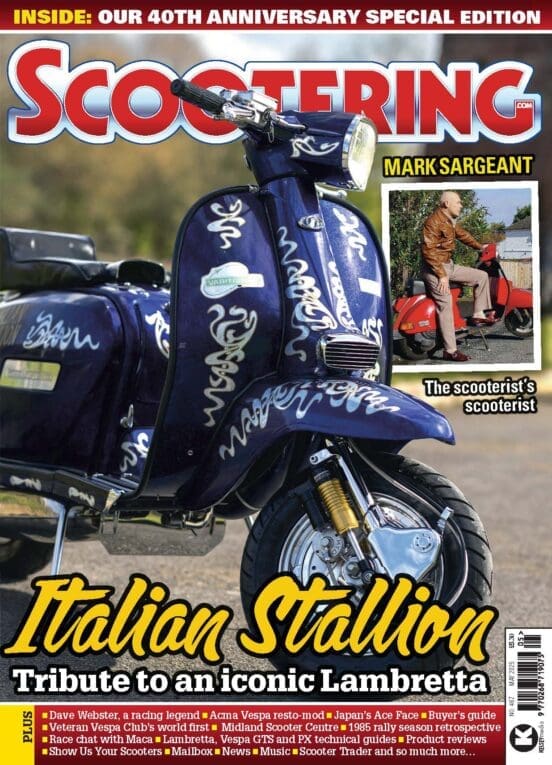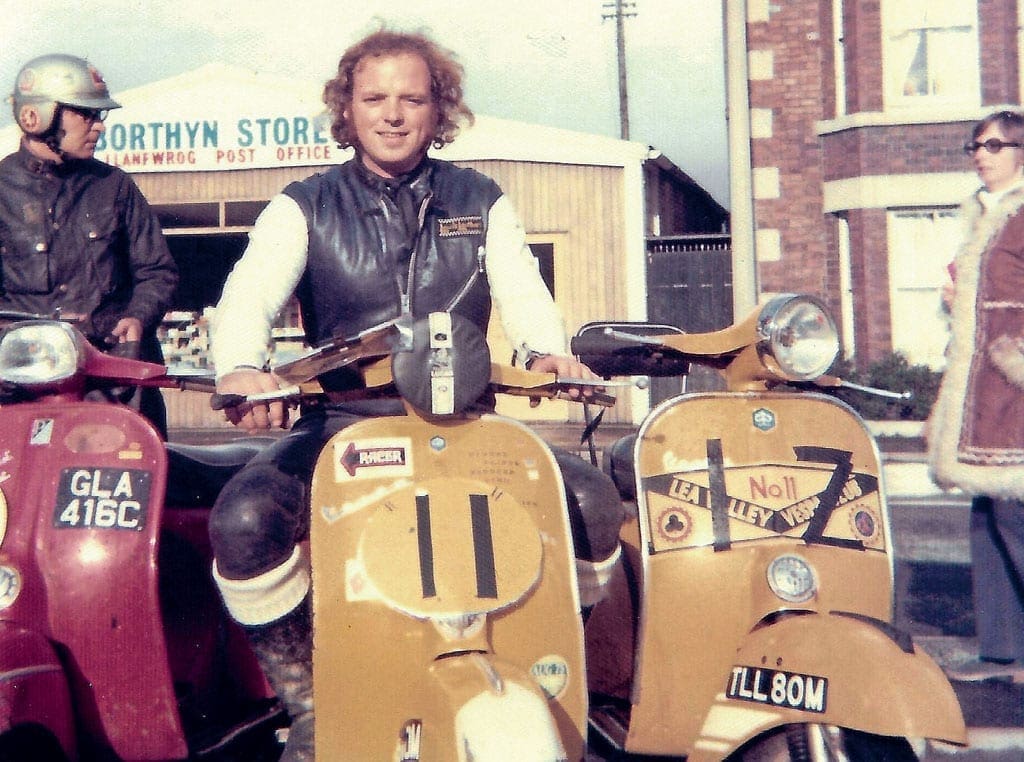
Words: Stu Owen
Participating in the world of scooter racing can be dangerous. Racing with friends meant you put your trust in them, and your life in their hands.
By the mid-1970s Kevin Walsh had become an experienced and well-seasoned scooter rider. Not just tied to one make either, choosing to own both the Lambretta and Vespa brand.
Even so, when it came to working on them he would openly admit that, in the beginning, his mechanical skills were rather woeful, to say the least. But by now it had been well over a decade since first venturing into the world of scooters, and during that time he had become at least competent when it came to putting a spanner to one.
Some of the local lads were far more professional in his eyes, and certainly when it came to the engine and, more importantly, tuning. It didn’t matter that he wasn’t the best, and it didn’t bother him either. He was just glad to be able to do the general maintenance himself.
A sporting life
Now firmly established as a member of his local scooter club, The Widnes Saints, Kev began to make many new friends within the Lancashire scooter scene. There were plenty of clubs round his neck of the woods and the surrounding areas.
It was a strange time, because scooter ownership as a mainstream form of transport had come to an end. With the Lambretta no longer produced and a thing of the past, all that was left was the Vespa. Even that was in decline or subdued when it came to how many new models were actually sold.
Though they were no longer part of daily life for the general public, they still had an attraction with the younger generation. That was how it would stay, as an underground movement, but one that would actually thrive.
Just being in a scooter club was fine, but for those with a more adventurous nature, something was needed to fill the gap. Since the beginning of the decade, scooter sport had grown massively, not just on the track, but with off-road events as well.
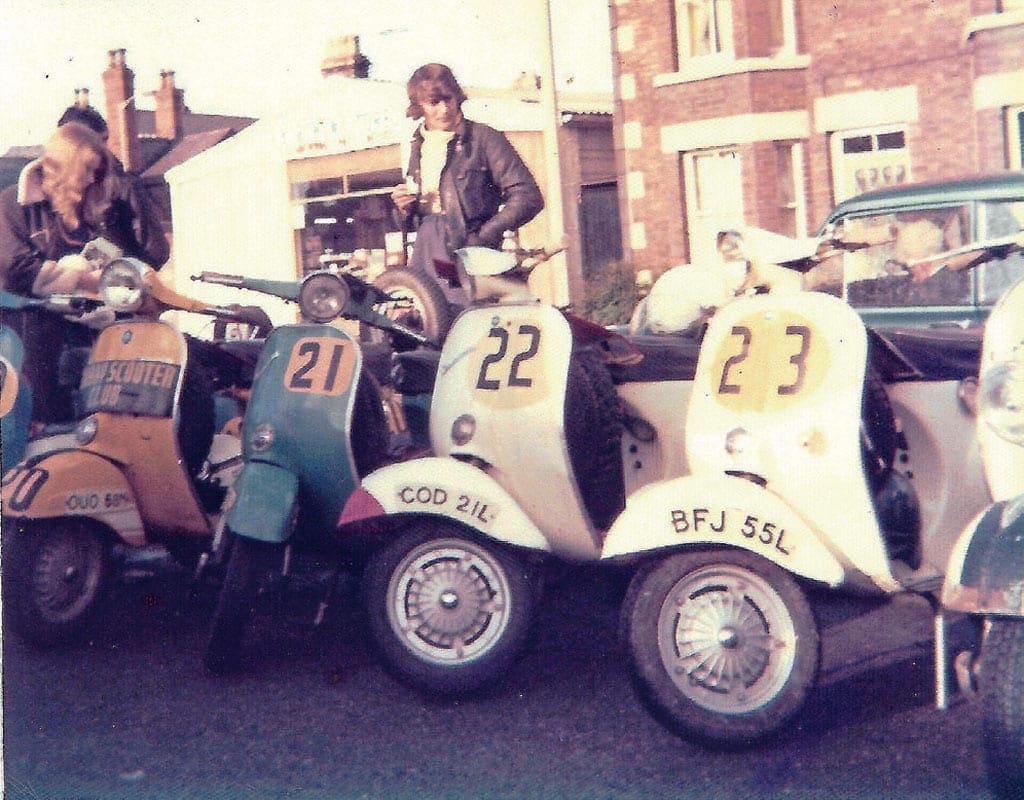
Though participation was a must for some, many scooterists were happy to just go and watch or, at most, help those that were racing. Kev and many members of the Saints fell into that category and would go along to these events, but it didn’t take long before they, too, wanted to get involved.
The problem was, you needed funds to do so by the time you had factored in a race machine, leathers, and a van to transport it all in. For Kev, that was out of the question, as by this time he was married and saving for a house, so the thought of going racing would only be a distant dream for the time being.
With more and more sporting events becoming a regular occurrence around the country, this meant some scooter clubs formed purely to be involved. One such club was Liverpool Sporting Scooter Club, which was local to Kev and the other club members.
Its driving force was Nick Banks, who also owned a scooter shop in Garston, just outside Liverpool, and aptly named Nickspeed. Nick had been running road endurance trials for some time and the Widnes saints were keen to become part of this culture.
Kev was just as eager as everyone else and finally taking the plunge, he purchased a 90SS from his shop. It had been worked on to specifically do trials, with part of the upgrade having involved changing the narrow drop handlebars for much wider ones of an SS 180. He instantly fell in love with it and prepared to take on a whole new challenge.
Rather than the mundane events many of the local clubs were offering, he would instead be competing in a proper sporting event. Nick was running one such event called the Tour of Wales which, in essence, was timed discipline on the road. Not out an out racing each other, that was never going to happen. Riders would set off individually to complete the distance in the shortest time possible.
John Illing described it as “a beast of an event” over a distance of 200 miles following the tight and twisty roads of mid and North Wales. John had competed in it before, with Kev acting as his main back up crew. Having taken on the same job at other events, this is where their strong friendship had originally blossomed.
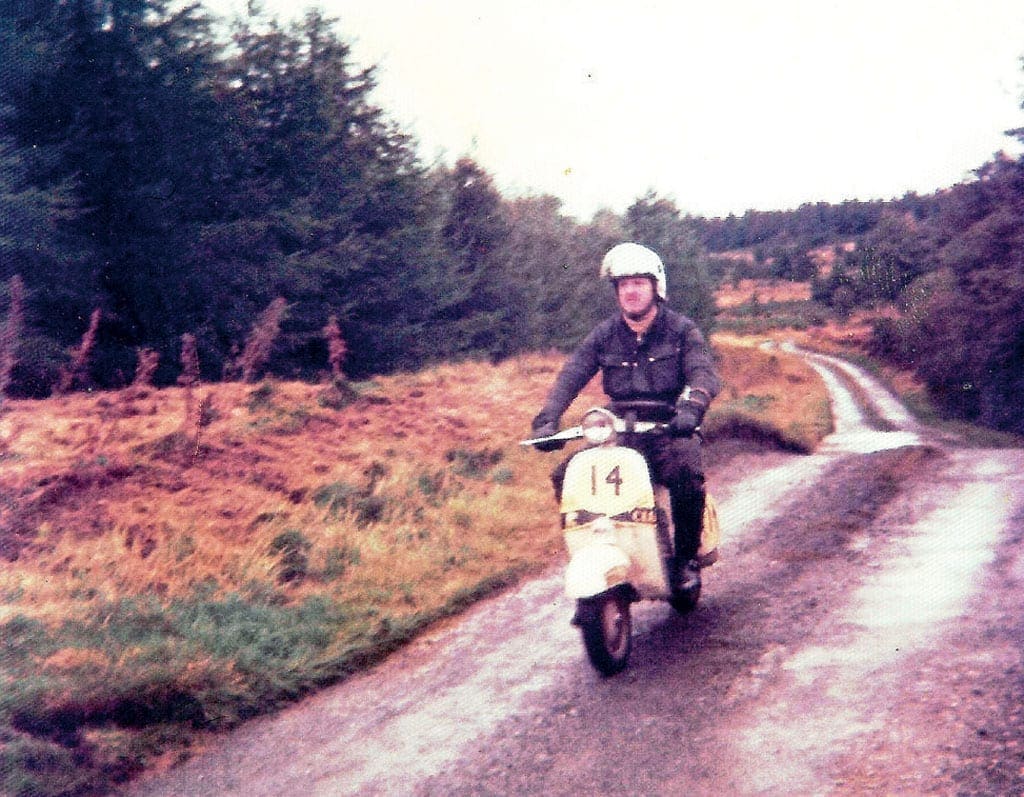
It was all right taking a supporting role, but from he wanted to be a main member of the cast. Now was his time. The 1975 Tour of Wales would have a new competitor on the entry list, a certain K.Walsh.
Kev openly admitted to having a slight sense of nervousness as he queued up to take his position on the start line. It was different from what had gone on before. Yes, he was involved, but only in helping John. Now he was competing against him.
The event would start at 9pm in the evening and finish around noon the next day. This meant much of the riding would be done through the night, and would thus require full concentration. The 90SS with its unique handlebar conversion performed flawlessly, as did the rider. Thankfully, the difficult night-time riding was over as the finish line drew ever closer. That’s when it all went wrong.
Whether or not it was a lack of concentration or perhaps carelessness in thinking that the hard part was over, no one was quite sure. Exiting a tight bend in the road, Kev lost control as the scooter started to skid sideward. As it corrected itself he was high sided and thrown in the air.
The inevitable impact with the tarmac was going to hurt and, sure enough, it did. Hitting the ground hard something had to give, and that something was his collar bone. Broken, there was no choice but to be carted off to the hospital where it would be X-rayed.
Despite his body having taken a battering, Kev’s pride remained intact, and though it hadn’t finished the way he or anyone else had intended, it didn’t matter. He had completed a dream, but in doing so it was time to think hard and long about the consequences of what had happened.
Time off work until his shoulder was healed would mean a loss of earnings. With rent to pay while at the same time saving for a house, perhaps the reality of competing came at a big cost. From now on things would have to be different.
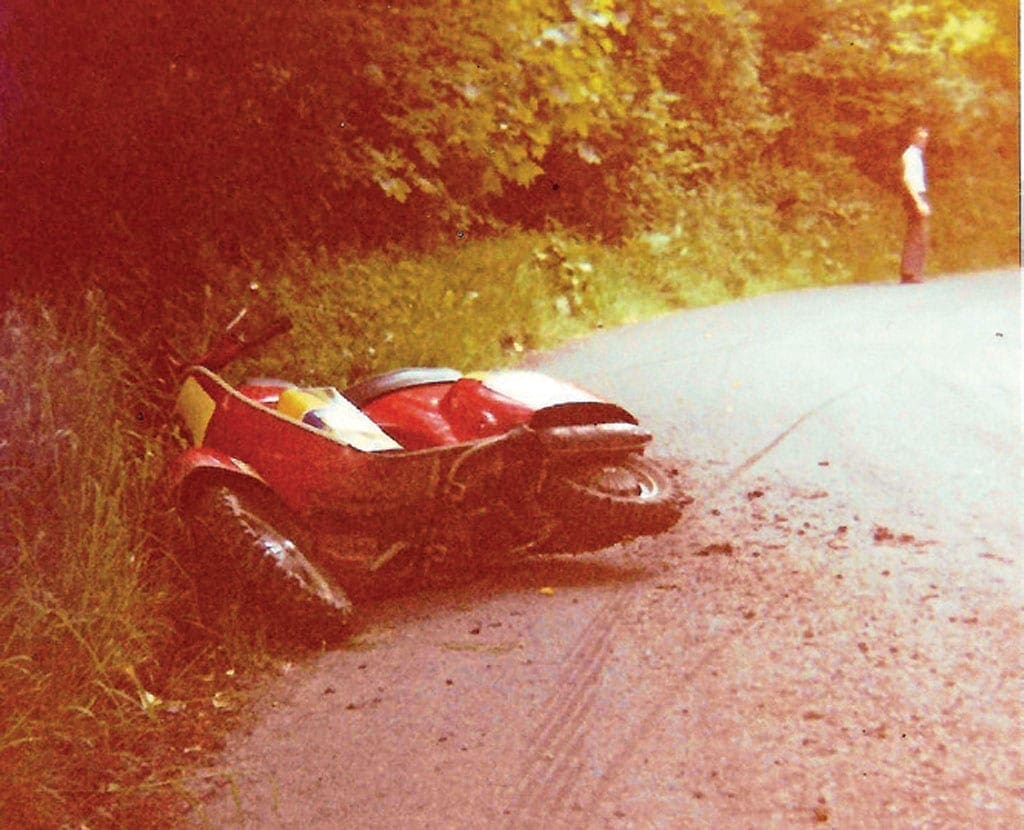
Passenger
Having put the Tour of Wales accident behind him it was time to move on, and though an event of that nature was out of the question, it didn’t mean there could be nothing else to take its place. From now on it would be the odd attempt at off-road trials and gymkhanas which, though not as dangerous, still came with their own risk. Kev enjoyed the sport and after a few attempts finally won.
The small frame Vespa was ideally suited for the tight, twisty and undulating courses. Despite enjoying what he was doing, there was still a hunger to go faster. That wasn’t possible competing at this type of discipline, and the answer lay elsewhere.
Circuit racing was still popular amongst scooter owners, and if anything was still on the increase since its explosive debut at the beginning of the decade. Though road trials were slightly different, surely this was a return to driving fast on tarmac if Kev’s new plan came to fruition.
John had been circuit racing for years but heavily concentrated on sidecars. That then was the answer, to be his passenger. Though it was still dangerous, this was on three wheels, so the chance of coming off was far less. Even so, hanging on to a chassis flat out and only a few inches off the ground sounded even more death-defying.
John already had a passenger, Nigel Ashbrook, who was another member of the Saints. One weekend, Nigel couldn’t make the event and knowing he was keen to have a go, John asked Kev if he would like to take his place. This was the chance he had dreamed of, and without hesitation he rushed out to get a set of fine black leathers.
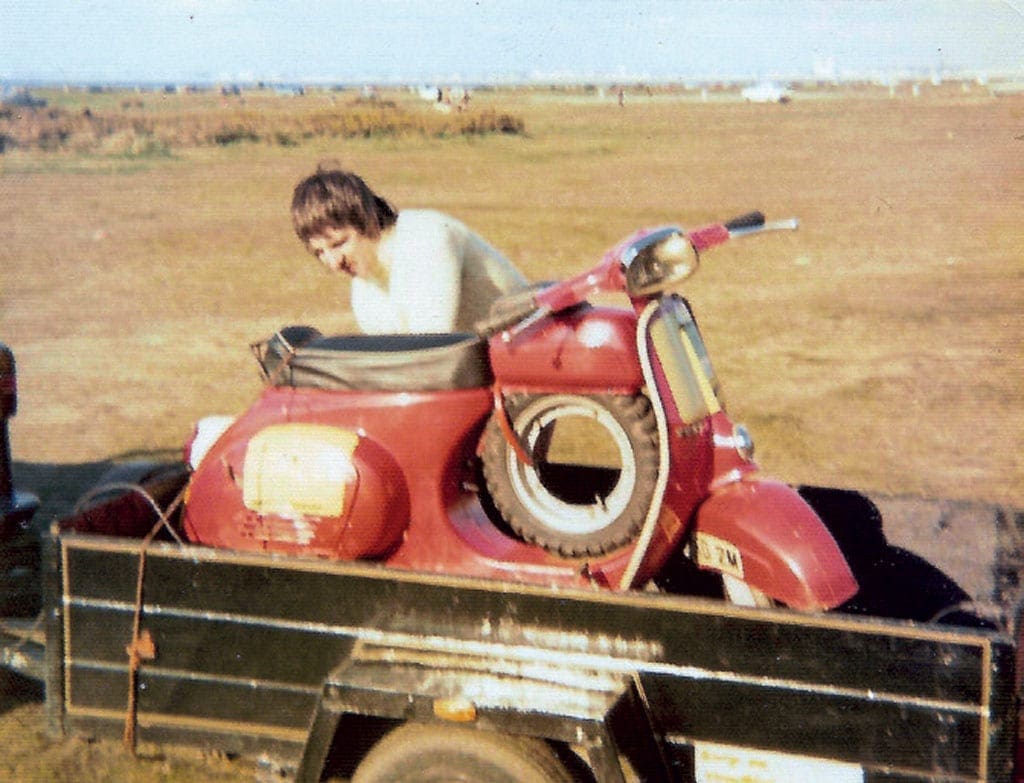
Licence and paperwork sorted, he would make his debut at Cadwell Park which, though it had plenty of tight corners and big gradient changes, had fast straights. For a novice, it was going to be a big challenge, but one he would relish and take within his stride.
There was no turning back now. Initially, it was a one-off invitation, but if he could manage the technique then perhaps the chance to go racing on a regular basis could possibly be on the cards. The Widnes Saints were a tight-knit group and all great friends, so Kev taking Nigel’s place as the passenger wasn’t anything discourteous.
The whole racing weekends away were seen as something of a release from the daily trials of life, and everyone did their part at a meeting. The problem was that Kev wasn’t cut out for it, and his Cadwell Park debut was his one and only sidecar race.
John was a seasoned pro, but the pair struggled to get around in one piece. Realising he didn’t have a natural racing instinct he bowed out, telling John he didn’t want to be responsible for both of their deaths. Nigel would want his seat back anyway, but this one-time outing proved he wasn’t cut out to do it, even if the offer ever turned up in the future.
Now it’s our turn
Up until that point, all Kev, John and the others had done was to compete in events, but never organise them. To do so meant that it might take the fun away at a meeting. Having to sort affairs out would mean less time to concentrate on the racing itself.
The Club had been approached by their local council around 1977 to put on an event in relation to some celebrations it was doing. It seemed rather odd that a scooter club would be asked to do this, but seeing it as a great opportunity, duly obliged. It would take the form of grasstrack racing, and proved that the club could carry out such a task when asked.
It wasn’t long after that, that by pure luck another chance to stage a meeting would fall directly into their lap. This time it was Battings Dam hill climb, which had been a regular event for years on the scooter sports calendar.
Those involved in running the hill climb had become tired of doing so, even though it was still popular amongst competitors. As John recalls: “We heard that it was going to be cancelled and so offered to run it through the Widnes Saints.”
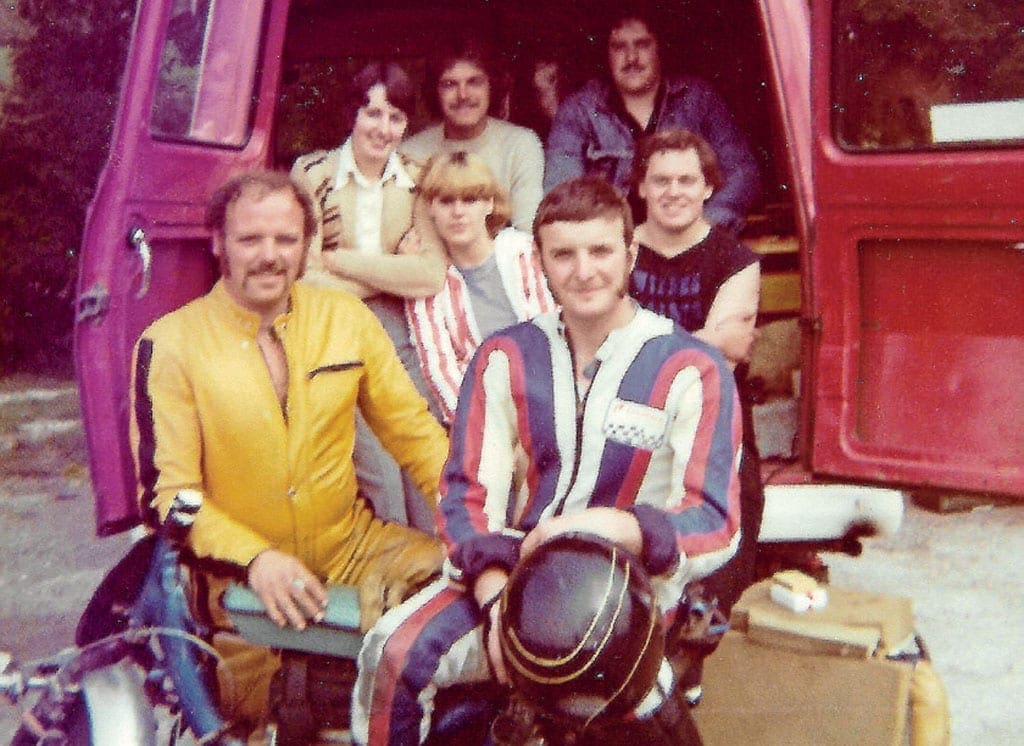
It was a busy time, what with resurrecting the LCGB but John, who by now had served many years racing, was keen to get more into the organisional side. Kev wasn’t involved in that year’s hill climb, but with John and the others would see it taken over by them through the LCGB, who would go on to run it successfully for many years to come. It would also link the LCGB closely to scooter sport at all types of racing events.
In later years, and with the success of the best supporting member championship, many meetings would become signing on events. Kev saw this as a way of making sure spectators would turn up, and though he wasn’t involved anymore, would do everything he could to support something that he had once competed in.
Many years later at Three Sisters race track, he would be given the rare opportunity to passenger a sidecar for a few laps. It wasn’t under race conditions, but more of a thank-you for all his years of support. It had been more than a decade since his last venture out onto the track, and technology had come a long way in that time. On a sidecar with a huge power advantage over what he had ever experienced, everyone carefully watched his exploits.
Upon returning to the pit lane, an exuberant Kev extracted himself from the outfit. In complete shock at just how fast it was, he was almost lost for words. His colourful language couldn’t be put in to print, that’s for sure.
Though his short-lived racing career wasn’t littered with podiums and trophies, it didn’t really matter. His desire to compete was the most important thing. Along with John Illing and the rest of the Widnes Saints, they helped keep scooter racing alive to a certain degree. That is something that Kev was proud of all his life.

